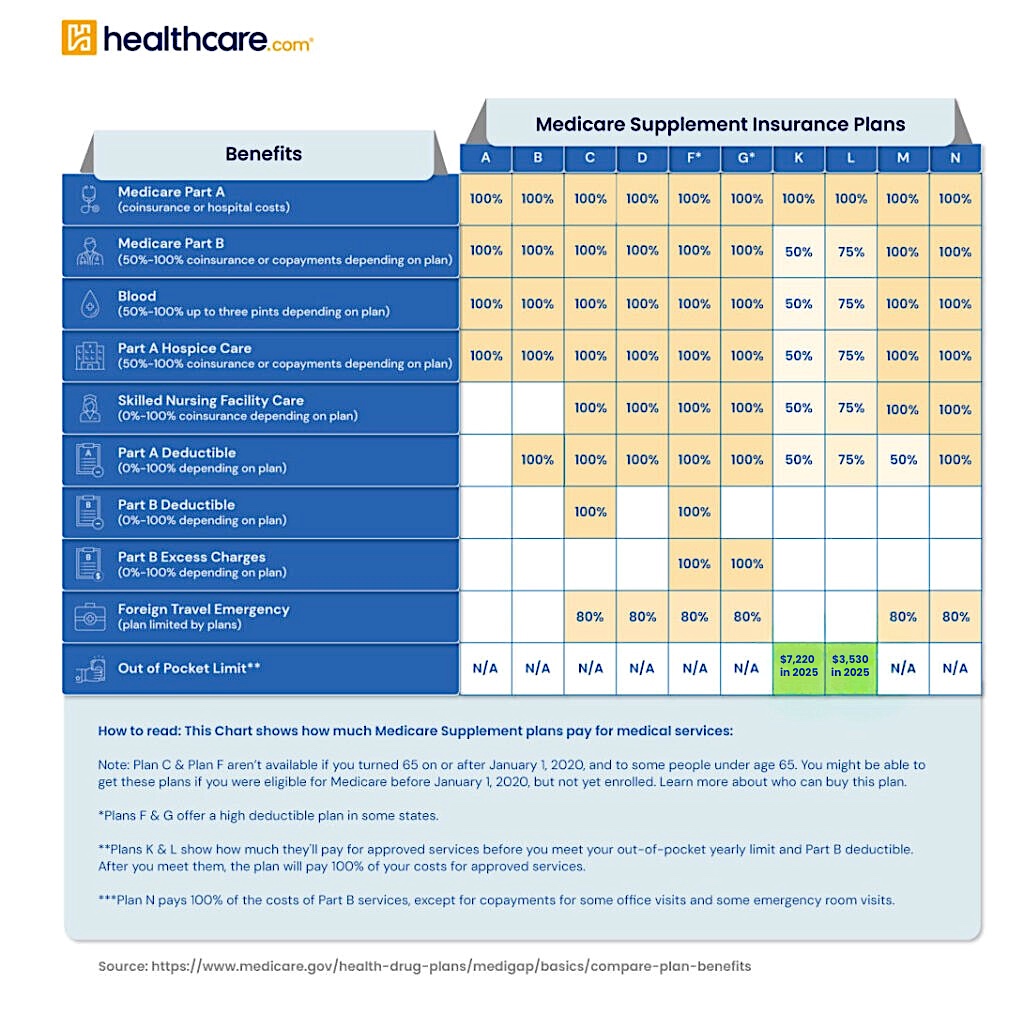Written by Leonie Dennis
HealthCare Writer
We aim to help you make informed healthcare decisions. While this post may contain links to lead generation forms, this won’t influence our writing. We follow strict editorial standards to give you the most accurate and unbiased information.
What You Need to Know
- Medicare Supplement plans, also known as Medigap, help pay for out-of-pocket costs not covered by Medicare Part A and Part B.
- Florida insurance companies must accept your Medicare Supplement (Medigap) plan application if you’re in your Medigap Open Enrollment Period or have guaranteed issue rights.
- The three most popular Medigap policies are typically Plans F, G, and N.
What Are Medicare Supplement Plans in Florida?
Medicare is a federal health insurance program for individuals aged 65 and older, as well as younger people with qualifying disabilities or chronic health conditions like end-stage renal disease (ESRD).
Original Medicare includes Part A (Hospital Insurance) and Part B (Medical Insurance). While it covers many healthcare services, you’re still responsible for costs such as deductibles, copayments, and coinsurance. Medicare Supplement plans, or Medigap, help pay for these expenses.
Medigap policies in Florida are standardized by letter (A through N), which means the benefits for a plan type are the same no matter which company sells it—though premiums may vary.
Learn how these plans can help Floridians manage their healthcare costs more predictably.
When Can You Enroll in a Medicare Supplement (Medigap) Policy?
You can apply for a Medigap policy at any time. However, unless you qualify for guaranteed issue rights, insurers can use your health history to deny coverage or charge more outside of specific timeframes.
Your Medigap Open Enrollment Period lasts for six months and starts when you are both age 65 (or older) and enrolled in Medicare Part B. During this period, Florida insurers must sell you any Medigap plan they offer without considering your health status or charging you more due to medical history.
Florida also offers a six-month open enrollment for those under 65 who qualify for Medicare due to disability or ESRD. However, premiums may be higher for this group. A second open enrollment period becomes available when you turn 65.
Guaranteed issue rights can also apply after certain life events, such as losing other coverage. If you qualify, insurance companies must offer you a plan at standard pricing and cannot deny you coverage.
What Are the Most Popular Medicare Supplement Plans?
Nationwide and in Florida, the most common Medigap plans are:
- Plan F: Offers the most comprehensive coverage, including all Medicare-approved out-of-pocket costs. Only available if you were eligible for Medicare before January 1, 2020.
- Plan G: Covers nearly everything Plan F does, excluding the Medicare Part B deductible.
- Plan N: Offers lower premiums in exchange for copayments for certain doctor and emergency room visits. It does not cover Part B excess charges.
In Florida, the vast majority of Medigap enrollees choose one of these three plans due to their extensive benefits and cost predictability.
How Do You Choose a Medicare Supplement Plan?
Choosing a Medigap plan depends on your healthcare needs and financial situation:
- Select a plan letter based on the level of coverage you want—Plan G and Plan N are popular for balancing cost and coverage.
- Compare premiums from different insurance companies. The benefits are standardized, but costs vary based on the company’s pricing structure.
- Understand how premiums are priced:
- Attained age: Premiums increase as you age.
- Issue age: Premiums are based on your age when you purchase the policy and do not increase due to aging.
- Community rated: All policyholders pay the same premium, regardless of age.
Always compare the same plan (e.g., Plan G vs. Plan G) across insurers to ensure a fair comparison.
Compare options HERE & start your health plan journey.

How Much Do Medigap Policies Cost?
Medigap premiums in Florida vary depending on:
- Your age and gender
- Whether or not you use tobacco
- The specific plan type (e.g., F, G, or N)
- The pricing method used by the insurer
Florida has favorable regulations—such as not increasing premiums based on age after purchase—which can help manage costs over time. Still, it’s important to shop around for competitive rates.
Compare options HERE & start your health plan journey.
What If You Want to Change Your Medicare Supplement Plan?
You can apply to switch Medigap plans at any time in Florida. However, if you’re outside your Open Enrollment Period and don’t have a guaranteed issue right, insurance companies may require medical underwriting. This means your application could be declined or result in higher premiums.
Florida law offers a 30-day “free look” period when you switch Medigap policies, allowing you to try a new plan while maintaining your old one during the transition.
What Are Alternatives to Medicare Supplement Plans?
Medicare Advantage plans are another way to receive your Medicare benefits. These plans are offered by private insurance companies and include:
- Part A and Part B coverage
- Often include Part D prescription drug coverage
- May offer extras like dental, vision, and hearing care
If you enroll in a Medicare Advantage plan, you cannot also have a Medigap plan. Medicare Advantage plans typically use provider networks (e.g., HMO or PPO), which can impact where you get care.
Learn more about Florida Medicare Advantage plans to see if they fit your lifestyle and healthcare needs.
Medicare Part D?
Medicare Part D plans provide standalone prescription drug coverage. You may need a Part D plan if you choose Original Medicare and a Medigap plan.
- Who needs it: Anyone with Original Medicare who wants drug coverage
- What it covers: Prescription medications; each plan has its own formulary and pricing
- How it’s offered: Through Medicare-approved private insurers
- Not needed if: You have a Medicare Advantage plan that includes drug coverage
Shop for a Medicare plan with additional benefits!
Do Medigap Plans Cover Prescription Drugs?
No, Medigap plans do not cover prescription drugs. If you need coverage for medications, you should enroll in a separate Medicare Part D plan.
Medicare Resources in Florida
Residents of Florida can access these resources for free support:
- State Health Insurance Assistance Program (SHIP): Offers personalized Medicare counseling and education.
- Florida Office of Insurance Regulation (FLOIR): Oversees insurance companies and handles consumer complaints.
- Florida Medicaid: Provides health coverage to eligible low-income individuals and may coordinate with Medicare.
Additional programs like Medicare Savings Programs and Extra Help from Social Security may offer financial assistance with premiums and prescription drug costs for qualifying beneficiaries.
Next Steps
If you think a Medicare Supplement plan in Florida is the right fit for you, begin by comparing plan types and insurers in your area. You can browse plans online or speak with a licensed insurance agent for expert guidance.
Don’t forget to explore Medicare Part D or Medicare Advantage options if you want drug coverage or all-in-one plan convenience.
Thank you for your feedback!
Kaiser Family Foundation. “Total Number of Medicare Beneficiaries.” kff.org (accessed October 15, 2021).
Florida Department of Financial Services. “Medicare Supplement Insurance Overview.” myfloridacfo.com (accessed August 26, 2020).
The State of Medicare Supplement Coverage. ahip.org. Accessed October 15, 2021.
“Medicare Supplement Insurance Overview.”
U.S. Government Site for Medicare. “Guaranteed Issue Rights.” medicare.gov (accessed August 27, 2020).
“Medicare Supplement Insurance Overview.”
“Medicare Supplement Insurance Overview.”
U.S. Government Site for Medicare. “How to Compare Medigap Policies.” medicare.gov (accessed August 27, 2020).
“Medicare Supplement Insurance Overview.”
U.S. Government Site for Medicare. “Supplement Insurance (Medigap) Plans in Florida.” medicare.gov (accessed October 15, 2021).
2020 Medicare Supplement Loss Ratios. naic.org. Accessed October 15, 2021.
“Total Number of Medicare Beneficiaries.”
U.S. Government Site for Medicare. “Medigap & Medicare Advantage Plans.” medicare.gov (accessed August 27, 2020).









